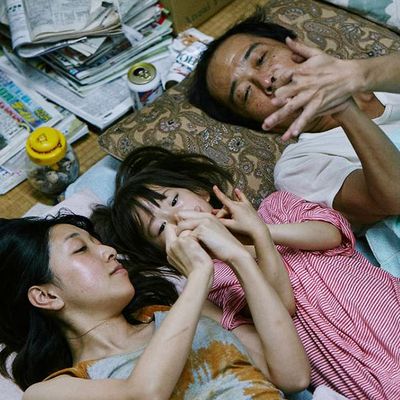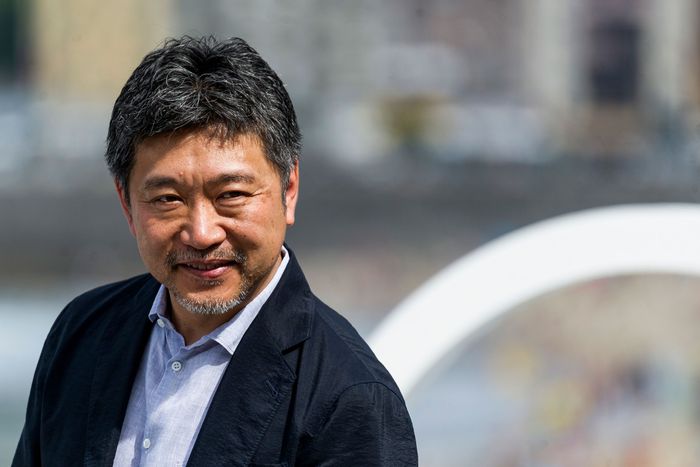
If home really is where the heart is, then Hirokazu Kore-eda makes home movies. The Japanese virtuoso has covered a lot of ground over his career’s two-plus decades — a manga adaptation here, a legal thriller there — but he’s met with acclaim as of late for his gentle, tender portraits of families in flux. We spend our whole lives hammering out status quos with our parents, siblings, children; Kore-eda lives to disrupt them by introducing a new factor that rearranges everyone’s emotional makeup. The arrival of a long-lost half-sister, the revelation of an infant having been switched at birth, or an ex-wife’s filing for custody will slowly, almost imperceptibly send the characters through full-blown crisis. Kore-eda’s favored tone strikes such a tranquil note that a viewer won’t realize the severe gravity of the stakes until they’ve already been walloped.
In this same mold comes the new Shoplifters, for which Kore-eda brought home the coveted Palme d’Or, the Cannes Film Festival’s top prize. In one of the slummier corners of Tokyo, the loving Shibata family gets by with precious little, the parents making ends meet through the occasional freelance sex-work gig or, more frequently, petty larceny. Their grocery-stealing hustle gains a new accomplice when they take in the precocious Yuri (Miyu Sasaki) from her unkind home, and the ensuing battle with governmental agencies to keep her in the family puts them all through the wringer. A common rap back at Cannes against the film was “slight,” that Kore-eda refrains from really driving the devastation home. I believe the converse is true, that his films present a master class in thoroughly shredding an audience’s heart without reaching a certain decibel level.
With the help of an expert translator, Kore-eda spoke on the phone to Vulture while out in Paris shooting his next movie with Juliette Binoche. (More on that below.) Mostly, he went deep on one of this year’s most sublime films: the politics and the non-politics, the symbolic significance of gluten cake, the banishment of poverty porn, and the poignant memories with which he filled this paean to the families we’re born into and the ones we make ourselves.
For American readers unfamiliar with the Japanese recession, can you speak about the socioeconomic climate in which Shoplifters is set?
The situation right now is that the poverty rate has increased quite a bit in Japan, and the number of people on social assistance has increased substantially. As an aging society, there are increasing numbers of people who aren’t working because they’re retired. All of this is putting a strain on the social-welfare system. I do feel that it’s to do with the present government, which promised to put more money toward the social-assistance programs, but instead bought many weapons from the United States.
At the same time, I want to make it very clear that this movie is in no way a criticism of a particular government or social system. In no way is it intended to reveal what’s happening. That’s the socioeconomic reality, but the movie’s not about that.
What of the brutally sad scenes near the end of the film, which see the children processed by governmental agencies? That’s not intended as a critique?
During the awards ceremony at Cannes, Cate Blanchett used the phrase “invisible people” to describe these characters. This is true, that they are, to some degree, invisible to the welfare system. But more than that, to me, the question is why those of us who live around these people don’t take the time to see them.
With Nobody Knows, Like Father Like Son, and Our Little Sister, you’ve made films about impoverished children and makeshift families before. On these specific topics, what new ground did you hope to break with Shoplifters?
What’s different is that in the past, when these families were first bound by kindness or love or some kind of connection, the family in this particular film has been at first bound together by money and their crimes to get it. It’s sort of like the big element that binds them is something that you can’t say is proper. That’s the change.
You’ve shown a clear interest in the concept of family, but the public knows very little about yours. What was your upbringing like?
In terms of family, my own is not directly expressed in the films, necessarily. But the current makeup of my family: I’m married, and I love my wife and daughter. As I grew up, I had both my parents and two older sisters. This is my basic background, where I’ve come from. But the way I look at it, this motif that I’ve worked with in my film has shifted as my idea of family has shifted in my 30s, 40s, and 50s. In one of the scenes in this movie, the little boy is sleeping inside a cupboard area. It’s a little ajar, and he’s looking out onto the other family members. I would say that is very much like me. I created a room out of that particular kind of cupboard, and it was an undisturbed space — my own space. I could lie down and look out through the ajar door and observe everyone else.
I’ve read that you visited an actual orphanage while researching this subject. What sort of emotional response did you have at that time?
I did not go to an “orphanage,” per se. I went to a facility run by the government that houses children with parents who are dysfunctional in some way, through alcoholism or domestic abuse or something like that. Just wanted to clarify that first. While I was there, a young girl in grade three had just come back from school, and she read for me the book Swimmy by Leo Lionni. I happened to be there in time to witness this. The people who worked at the facility went, “Oh, no, don’t bother him; he doesn’t want to listen to this.” But she completely ignored them and kept reading this book right to the end. And at the very end, I applauded because she had done so wonderfully. The girl was absolutely thrilled by this, and she smiled a big smile, and it occurred to me that it was her parents that she wanted to have witness this reading of Swimmy. This moved me. That was the feeling I took with me when I made Shoplifters. The young boy in the film reads Swimmy, to show to his parents that he’s reading. That sense of pride and joy that the little girl had was something I held with me.
Do you find it challenging to depict scenes of poverty without inadvertently exploiting these characters’ struggles? How do you show the drama of these lives without making the audience feel like they’re gawking?
Sort of like “poverty porn,” you’re saying?
That’s exactly right. What’s the technique to avoiding that stance?
I don’t think it’s a technique. I don’t think that’s something you can make up, or trick people into believing through your filmmaking. It comes from the fundamental worldview, the sense of humanity. It comes from the depth of the work’s creator. If you have that empathy, you won’t go down the road of voyeurism. You can’t just sympathize; you have to make visible what is invisible. Make visible the factors that have brought the impoverished to this point, so that the audience can see them in a fuller and more complex way. That skirts the trap of poverty porn.
Regarding your initial question: I don’t want to present the film in such a way so that when the audience leaves the theater, they say, “Well, it’s the government’s fault! It’s the system’s fault!” That’s not what I’m trying to portray. They’re part of it, but the people watching the film are part of it, too, and they need to feel that by the end.
Watching the film, I started to crave gluten cake, which has a special place in the family’s life. Does that particular food have a sentimental significance to you?
That’s kaofu, which is made of wheat gluten. On a simple level, when I was young, I loved kaofu. So there’s a nostalgia there. I think it has to do with the older women. To a modern-day palate, that’s not something that everyone likes, but it’s very dear to the older generation. I remember eating it to please my grandmother, and its inclusion in the film has to do with that gesture. When the little girl Yuri says, “I think that Grandmother’s in heaven,” she’s saying that the happiness she felt eating the gluten cake brought Grandmother happiness as well.
Congratulations on winning the Palme d’Or. Have you noticed any change in your career and the opportunities available to you in the months since Cannes?
Thank you very much. I’m filming in Paris right now, and I’d like to say that it’s because of the Palme d’Or, but in fact this has been in the works for quite some time. Just after receiving the Palme, I flew to New York to speak with Ethan Hawke in the hopes of having him work with me on this film I’m on set for now. I was able to meet with him directly, and he congratulated me as well, adding, “Well, now that you’ve won the Palme, it’ll be really hard for me to say no!” In any case, perhaps it helped, and if that’s the case, it’s led to a wonderful working relationship.
I’d heard about this — Verite, with Juliette Binoche, yes? Is the choice to work with Western actors for the first time dictated by the script?
The project that I’m working on at this time is based on a theatrical play I wrote many years ago, never completed and left as a basic idea. The possibility of working with Juliette Binoche first came up ten years ago, and I just thought, Maybe I can take this play out of storage and see what I can do with it. We didn’t use the whole script, it really just formed the basis of Verite, but that’s how she came to join the cast.


